Views
Back to Personal Views > Publications & Opinion > Back to Homepage
Money, Chips & Bits
Peter Cochrane
Prologue
No doubt about it, predicting the future is a tricky business. On the one hand a linear extrapolation from the past into a future some 20 or more years out, has been, and still seems to be, pretty accurate. What makes it tricky is the unpredictable coming in from left field. The paradigm busters seem impossible to predict accurately, and our past is full of those making statements discounting much of what we now take for granted.
"Heavier-than-air flying machines are impossible"
Lord Kelvin, 1895
"(Television) won't be able to hold on to any market it captures after the first six months. People will soon get tired of staring at a plywood box every night"
Darryl F Zanuck, 20th Century-Fox, 1946
"I think there is a world market for maybe five computers"
Thomas Watson, chairman of IBM, 1943
"There is no reason for any individual to have a computer in their home"
Ken Olsen, DEC, 1977
"640K ought to be enough for anybody."
Bill Gates, M-Soft, 1981
During the industrial revolution railways wiped out barges and canals, the car wiped out the train, and aircraft sank the big liners sailing the North Atlantic. But more significantly, electronics, thermionic tubes, transistors, integrated circuits, satellites and optical fibre arrived to give us telephones, radio, TV, computers and networks of incredible performance, and all unimaginable only 50 years ago. Moreover, these are all at a cost that everyone can afford, and they have totally transformed our business and social lives in less than one human generation.
We have seen the systematic destruction of old industries by the arrival of the new over millennia. And today we look into our crystal ball and try to gauge and predict the implications of the information revolution. Without doubt the internet looks set to be the biggest paradigm buster we have ever seen. It is touching and changing everything we do, whilst enabling a new and vigorous economy of bits. In this world entire economic sectors and industries are being destroyed or radically transformed in just a few years. In some cases the changes being enacted are so radical, we might ask; is this the end of the old financial world, its institutions, and even money?
The Plot
One of the earliest lessons we learn in science is the power of the logarithmic scale to straighten out the curves. Plot the growth of the Internet on such a scale (Fig 1) and it looks like a well-behaved and linear progression - nothing to concern us at all. However, a linear plot (Fig 2) reveals a very different story. When we see a violent (knee or hockey stick) upturn in any physical system it spells - phase change. This is an ice turning to water, and water turning to steam, type of event. Our society and commerce is now subject to a change mechanism of a new kind. Nothing will ever be the same again.
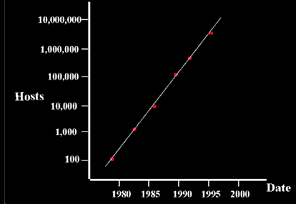
Fig 1. Internet Hosts - Log Scale

Fig 2. Internet Hosts - Linear Scale
Bits & Chaos
Like it or not, understand it or not, our world has made a subtle transition from being dominated by atoms to being dominated by bits. It has been transformed from a visibly stable place to being visibly chaotic by the spread and speed of telecommunications and the power of computing. Just before Christmas 1999 there was a complete yo-yo famine. Why? The power of communication meant that the fashion propagated to every corner of the country in days. Remember Cabbage Patch Dolls, Buzz Lightyear, Star Wars figures and more? Suddenly every parent has to get their child the same toy as their peer group within the same few weeks. This is retail chaos on a grand scale, and the toy a strange attractor.
For telecommunications networks coffee is now just one of many strange attractors. At a large conference no one is using a mobile phone during the proceedings, they are listening to the speakers, until coffee arrives at 10.15 that is. Within minutes over 100 mobile phones are out and people trying to make calls. Not surprising then that the cellular phone site falls over and people are disappointed. A few weeks ago a ladder fell of the back of a builders truck onto the fast lane of the M25. Every vehicle that swerved to miss the ladder tried to call 999, and the emergency service was disabled for over an hour until the ladder was removed. Plane and train cancellations, traffic jams and budget changes to the price of petrol all constitute very new strange attractors. Similar crowding and swarming behaviours are also visible at ATMs, banks, and stores when the sales start.
The internet seems to have an infinity of strange attractors that promote chaotic action on a huge scale. Within minutes of the latest Star Wars Movie site going live it was receiving thousands of hits per hour. For weeks it was completely log jammed, and so were or all the arterial routes leading to it. Let us put some dimensions to all this. The old telephone network was engineered to cope with you and I making an average of 3 telephone calls every day of 3 minutes duration. The aggregation of millions of phone lines saw a peak-to-mean traffic ratio of around 3 - 4. On the internet things are far more volatile with reported peak-to-mean ratios of over 1000. Fig 3 gives a sample of activity at one

Fig 3. Net Visitors Come in Packs
Adam Smith got IT Wrong
Since Adam Smith published 'The Wealth of Nations' economists have assumed a bounded and well-behaved world with supply and demand regulating prices. Stable markets and singular stability points have been the overriding view. And in the past this was more or less correct, although there have always been some significant disagreements between economic theory and practice. So despite some very obvious anomalies, economic theory and understanding is still largely dominated by linear models involving negative feedback and control. Only a few have conceded that positive feedback, feed forward and multiple stability points occur. Even fewer have recognised that chaos is the dominant mode. It is as if they have yet to see their first mountain. The universe, physical terrain and economics are not flat, they are lumpy and extremely varied. And like climatic conditions they are also inherently unstable when viewed over a sufficiently long period.
The Bit Economy
Three principal changes make conventional economic theory dangerous for individuals, corporations and nations. Firstly; the transition to a bit economy sees no finite limit to the creation and supply of soft products. Secondly; their supply and delivery can be ubiquitous, unlimited and instantaneous. Thirdly; soft product prices and production costs can be almost unrelated in any way. A physical product (hardware) will have a research - development - production to price ratio in the tens. In contrast, bit-ware will have such ratios in the thousands or millions. Communications, computing and the control of everything by bits instead of atoms has catapulted economics into a new domain well beyond the thinking of the Smith-ites. It has created new levels of interaction and complexity with a surface more like the moon rather than some convenient salt flat. Economics is no longer well behaved with occasional depressions and universal stability points, it is dynamic, craggy and chaotic. Just over 50% of the USA Stock Market value was created in just 12 months through internet business growth and it could be that this new economy will eclipse the old in just 10 years.
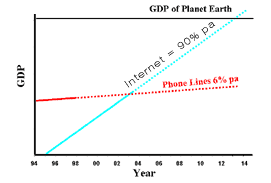
Fig 4. Internet Growth Eclipses the Telephone Network and the GDP?
Selling More
The networked world is full of opportunity and an infinity of routes to customer and customised product. Unlike the past, this new-world has no limit to the number of bits that can be produced and communicated. It also means selling >1000x more at < 0.01x the conventional price to realise market domination, and huge incomes in very short time periods. But with the richness come new surprises and new business models, because this world has a myriad of stability points, and counter intuitive outcomes.
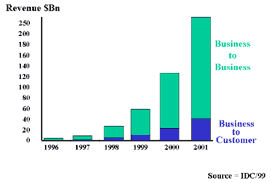
Fig 5. USA E.commerce Revenues
Gross Bit Product
Currently there seem to be three broadly contradictory views of the global economy. One suggests a steady but unimpressive growth, another says everything is almost flat, and a third suggests slow decline. This seems so obviously wrong from any practical standpoint as to be barely credible. Individually and corporately we have become so much more productive through the use of IT that it is hard to see why this is not reflected in the economic indicators. I suspect that the economic measures and forecasts have been overtaken by a faster world of bits and do not return an accurate picture. The Gross Domestic Product (GDP) for example is considered to be the broadest measure of aggregate economic activity to encompasses every sector:
'For investors it is the consummate measure of economic activity because it dictates how investments will perform. The stock market likes to see healthy economic growth because that translates to higher corporate profits. The bond market doesn't mind growth but is extremely sensitive to the economy growing too quickly and paving the road to inflation. By tracking the GDP, investors will know what the economic backdrop is to their portfolios'.
This seems to be based more on doctrine than any practical basis. The definition of GDP is delightfully varied, but broadly falls inside the following envelope;
'A measure of the total production and consumption of goods and services - the market value for all final goods and services produced within a nation in a given time period. Intermediate goods such as plastic, glass, wood, cotton, etc are not counted since they are not in their final state. Including only final goods and services prevents double counting and avoids a GDP overstatement. Final goods include household purchases since these items are not used to produce other goods and services. GDP consists of four key components: Consumption (C), Investment (I), Government (G), Net Exports (NE)'.
So the:
From any system design stand-point it is hard to see how the economy of our planet could be accurately defined, or be even remotely indicated, by a single one-line linear equation. Where are the black, grey and bit economies in all of this? For sure they are very real and very significant, and in the case of the grey and bits, growing very fast.
From a practical standpoint it seems that the GDP should be principally defined and measured in terms of some entropic measure related to the transformation of materials and bits. Their actual and final place, method, and mode of consumption may turn out to be a secondary effect in the overall rating. The accepted definition and formula above (1) seem to fall far short of the mark, and I suspect that the true GDP is actually tracing some exponential curve like Moore's Law for chip development and performance. If this is the case economists can expect some serious repercussions from sticking with an 18th Century perspective and not embracing the Gross Bit Product. One day they may find their world has gone, along with the significant tax revenues it generates. If so, it will have been replaced by a bit economy growing at an exponential rate.
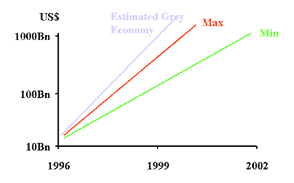
Fig 6. Internet Economy Growth
E.farming
Increasing numbers of young people are leaving university and companies to initiate or join new start-ups. This is not just powered by the opportunity to make money, but by the frustration with the old ways of doing things. The net-culture is creating a greater sense of urgency, opportunity, and a seize-the-day culture. The opportunities are great in a connected world where geography and time are no longer limitations.
In the USA money is available to do almost anything, but there is a shortage of good ideas and people. Their solution has been to comb the world and migrate the people into the USA, as a result Silicon Valley is full of Europeans and Asians. This is how Victorian England was - rich, confident, and attractive to people willing to risk everything to create the new. The latest rise of the UK Economy offers an opportunity to realise new wealth in new E.markets. What is missing is the vision to create the right environment and money availability. A young MIT graduate recently raised $25M to start a new company, and his chances of success are very high. In the UK he would be lucky to get $0.25M and his chance of failure would be almost certain - he would simply run out of money and be starved of support.
The long term success rate for new start up E.businesses is ~2%. So to get a success means 100 or more new start-ups, which by USA standards would require a fund in excess of $1Bn. But the payback could be on the scale of Yahoo, Amazon or Ebay with valuations of $6Bn in 5 years. It is unlikely that a single UK institution could afford such a risk, or avoid the temptation to meddle with the operation as it developed, and thereby predicate failure.
A new success focused model would see 10-20 large companies clubbing together to invest 5-10% each in a single start-up. This would create a capital without interference environment. Also, the start-up could tap management, financial, technical, market, and contact support from the hosts companies. Each start-up could also be directed to trade amongst each other to form a virtuous circle of dependency.
Given that the USA appetite for people and expansion, we should consider the risks of not doing this. The words technological imperialism spring to mind. They no longer have to attract people and ideas to the USA - they are all on line and available for the picking - just like farming.
New Rules
It is interesting to reflect on the manner in which the internet economy is built and rapidly grows. Traditionally a company growth was linked in a sensible manner with profit and market capitalisation directly linked in a positive manner. However, internet companies seem to defy all logic - Fig 7. What is happening? On closer examination it becomes clear the negative relationship is about establishing market share and market domination. Forestalling profits should see the final turnover and market capitalisation level on a different plane to that of a conventional company - with an earnings per man some 10 - 100 time greater - Fig 8. Further, this will also have been achieved for a far lower level of up front investment - Fig 9. Internet companies really do herald a new era of commercial development and finance - they just don't obey the old rules and business wisdom's.
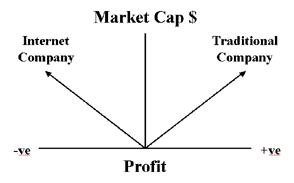
Fig 7. Company Company Operational Modes
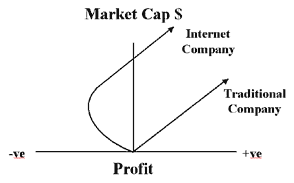
Fig 8. Internet Company Long Term Market Cap
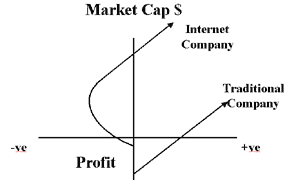
Fig 9. Company Initial Financing
Looking at all the preceding evidence we might conclude that the following general laws apply in this new business domain:
|
Embrace computing and network power |
|
A key enabler |
|
More give/creates more |
|
Success is highly non-linear |
|
Make virtuous circles |
|
The cheapest wins |
|
Follow the free |
|
Concentrate on networks first |
|
Let go and empower |
|
Nets win |
|
Give birth to new enterprises continuously |
|
Expect a high mortality rate |
|
Seek sustainable and continuous change |
In a stable world we would build up a wealth of experience that has value and is vital to our survival and prosperity. But in a world that is highly unstable and changing fast it is generally the case that experience can be detrimental or even dangerous. So we might construct a Fitness Function for a company that includes all of the positive and negative parameters related to the above Net Economy Laws. This is shown, in a truncated form, in Fig 10. Notice that experience is on the bottom line! The Internet has disintermediated many businesses by breaking the old paradigms, and by adopting new and counterintuitive business models. Non of our past experience predicted Yahoo, Ebay or Amazon.
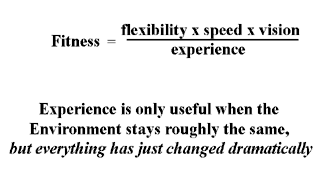
Fig 10. Company Fitness Function
The Cost of Money
Whenever you visit a bank the processing costs around 64p. Moving money by telephone banking costs 34p or so. An ATM and credit cards cost around 27p. But a transaction conducted over Internet costs in at around 0.5p - Fig 11. When buying expensive things the cost of processing money can easily be absorbed, but when we wish to purchase low cost items we have to resort to tokens - cash. Among the invisible costs associate with purchasing anything are the research and development, productionisation, packaging, delivery, display, marketing and advertising costs. Textbooks go into great detail on the relative sizes and amortisation of these elements, but nowhere is the cost of money and transactions detailed as an explicit part of the total equation. As the world becomes bit dominated, this will become an increasingly important factor. We have to get the cost of billing to be a mere fraction of the items we are buying or trading. When the contents of a music CD cost less than £1, it will be wholly uneconomic to use a cheque or a card, especially when the bits are delivered on-line.

Fig 11. The Law of Diminishing Returns
Banking
Historically banks have been in the trust business. We trust them with our money and we trust them to be honest. In the future a major part of that trust function will be linked to brand. We already have retail chains, motor manufacturers and airlines moving into this sector through the card business. Soon we may see even more entering through the bit business. The production, buying, selling, delivery, service and support of all goods via the screen opens up new opportunities for the transformation of trade. Consider the coming together of an entertainment company - a bit producer, software company - a bit manipulator, telco - a bit transporter, logistics company - a transporter and organiser of atoms, and a bank - a billing machine. This would be a new, and previously impossible, business with a unique synergy of customer information.
Outsourcing
As a general rule banks outsource their IT and networks, but very few, if any telcos, ISPs, software, logistic and manufacturers and entertainment companies outsource their billing systems. When these businesses are performed over electronic networks it becomes more than a possibility. Billing ultimately becomes untenable in the old way and by the old mechanisms. For example, in some regions of the world it costs more to collect the money from low usage telephone customers than the amount they spend. But even with relatively expensive things like road tax and insurance premiums, the cost of collecting and processing money is grossly inefficient. For a computer or music CD, the atoms - disc, plastic box, and paper cover - cost just less than 50p, and rival the content cost. The bulk of the expense is in the display, delivery and purchasing process. So there may be a new and pivotal role for the banks as they are principally in the bit business.
Logistics
Internet book and music stores already deliver savings of 40% or so to people who buy electronically. As more people and organisations get on line there will come a critical point at which the old purchasing and delivery mechanisms will collapse under the pressure of this financial focus. By and large there is no money in information, but there is money in the information about the information. More simply put: we will pay more to locate, purchase and have something delivered, than will pay for that thing! So logistics will become a major new growth area, and as life speeds up we will need far more intermediaries in the world of bits than ever there were in the world of atoms.
As a direct result of money moving into the bit world we will see an exponential increase in the transaction costs in the world of atoms - money and cheques will become even more expensive - as will a trip to the bank. Whilst cash, cheques and cards have managed to coexist, bit based trade is unlikely to be that tolerant.
Bit Barter
The impracticality of barter on a large scale prompted the world of coins, paper, cheques and plastic that is now dominant. This in turn may be eclipsed by electronic cash, which will see even more flexibility and convenience. Ultimately, micro-payments could revolutionise the concept of money. But there is also a new option that is prompting a hidden trade that could build fast - bits for barter. Electronic working makes it so easy to advertise atoms and bits for sale, and find a match in the global market.
Living in a village, town or city gives opportunity for a black economy of people trading goods, skills, services and assistance on the nod. However, it is an economy limited by the bounds of word of mouth advertising and communication. So it tends to be confined to friends and acquaintances - people who trust each other. In this context we should recognise that financial institutions overtook and replaced large-scale barter on the basis that they provided a trusted mediation mechanism. Money replaced pigs, goats, corn, sweat and toil. Along with this trust transition to money came the standardisation of price and the efficiency of the 'haggle free' market.
The wheel turns full circle, and centuries after the invention of money and the rise of financial houses, a new-world has emerged with the possibility of global barter. How much easier it is to advertise and trade on the net where there are no frontiers, barriers, or limits. All bits are potentially for sale, for more and different bits. Even atoms and services can be traded. Inspect, try and test the goods on the net, agree a trade and send by snail mail. Need some advice or a service? Access it all on-line and pay by bits or goods. Somewhere on the planet, someone has what you want and needs what you want to be rid of. Only the advertising and mediation process has stopped this being affected. But now it is available on the net.
The global black economy is already reckoned in the £100s of billions. Here then is a mechanism for it to get even bigger. Will we see electronic trading posts - frontier style - with human agents haggling in Bytes? Or will we be more relaxed in the bit world, and be driven by perceived quality and need rather than raw quantity and availability? Duplication, pirating, modification and additions to soft products will then have a whole new meaning.
How do you collect taxes to support the infrastructure of a nation when no money is exchanged, or is in such small increments you cannot afford to collect or police the system? With micro-payments, a million transactions of 1p is bad enough, but taxing each exchange at 17% is impossible. Trading bits goods and services with no means of interception and recording is even worse. This could become a macro-economy of micro things, well beyond any fiscal process yet in place or conceived. Perhaps we have to think:
Outsourcing
As we work harder under increasing competition driven by technological change there will be no time for decorating, gardening or car cleaning. Curiously we often pay more attention to our company accounts than our domestic situation. An effective solution is to outsource all personal finance management with provisions for pension, and insurance for the unforeseen. We are moving toward a more complex world of rapidly changing fortunes, job changing, and for most, multiple employers. Thirty years ago a professional might have expected to work for 3 employers in a lifetime. Today it is in excess of 7, and in the future it may be more - see Table 1. Managing the tax, pension, insurance and stability of such a life could be a nightmare without electronic outsourcing.

Fig 12. Some Half Lives
I recently met a young lady who had graduated, worked for 18 months in a major company, and then gone freelance. Her current, and multiple simultaneous employers, will total 35 by year end. Who should she turn to for assistance? She needs a bank with all the data and expertise to hand so this growing problem can be reduced to a software package. She needs real time business management as much as a company.
Legacy
Whilst reflecting on the madness of a world awash with 21st century technology embedded in 16th century processes; the inconvenience of the train ticket, coinage and rubber stamp mentality stood out. Consider the inconvenience. From passport control at airports to supermarkets, waiting, and queuing is now endemic. Often the cost of waiting exceeds the cost of goods, or amounts to a substantial proportion of a total journey time. Just how much waiting time does a loaf of bread or an apple warrant? What is a reasonable proportion of the total cost? Well, most people get paid more than one apple a minute or a pack of sandwiches an hour. But on this basis buying a house or a car is very efficient.
Buying everything from socks to gasoline, and information processing by humans is the limiting factor. What should we be doing? Well a single chip on a smart card can now store all our vital information and much more. Our medical records, insurance, passport, bank details and employment history could be written into the one device. Add a short range wireless transmitter-receiver, and we have a personal transponder - just like an aircraft. We can be identified and information accessed or updated with no physical connection. A very low cost printable chip can also be used to replace the bar codes on all our goods from Cornflakes to beans, books and trousers. So in principle, all our problems are over. Just wander into a store, collect what you want, and walk out. The recognition of us and all the goods can be automatic, along with the accounting and stock control, plus of course the exercising of all our insurance options. We are then the masters of our own delay, the world goes at our pace, and finance is as invisible as the air we breath.

Fig 13. Machines Overtake Mankind
The speed at which this is all happening can be gauged by the fact that today 40% of all the bit traffic on our networks is between machines and not people - Fig 13. By the year 2010 this figure will have moved up to 95%, and there will be far more machines on-line than people. Everything we buy, own and use will be on-line, and they will afford us many new freedoms, and probably enable the next move beyond the Internet. Somehow I don't think the machines will see money and finance in the same way we do.
Word Count = 4521